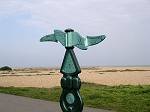|
Recalling the days of World
War II
On Sunday, 4 September 2005, Walmer remembered the
grim days of World War II.
Bright sunshine, music by the Railway Swing Band and
displays of World War II memorabilia tempted hundreds
of people to gather on Walmer Green for an event organised
by Walmer Parish Council to celebrate the 60th anniversary
of the end of the 1939-1945 conflict. Then had been
a time when the parish and its neighbouring town of
Deal had found themselves "in the front line".
Following the declaration of war between Britain and
Germany on Sunday, 3 September 1939, nothing much happened
- apart from a false alarm - until May 1940 when France
fell and Kent's east coast was only 22 miles from the
enemy. There was mass evacuation of civilians and an
influx of troops to defend the area. Huge defences were
constructed along the beaches and gun batteries installed
at Sandown, Deal Castle and Kingsdown.
An article in Illustrated magazine for 7 September
1940, suggested that the Channel was a more formidable
barrier to invasion than many appreciated. The author
believed that a combination of unpredictable weather,
fierce currents and tidal streams and ever-changing
depths would prove a nightmare for German military planners.
Very possibly propaganda to reassure a nervous British
population! And certainly unlikely to have influenced
Hitler... although, of course, he did drop his plans
for "Operation Sea Lion" and invasion of England
on 17 September 1940.
Many of Deal and Walmer's early evacuees returned,
despite the threat of shelling from huge German guns
on the Pas de Calais coast and frequent air raids by
the Luftwaffe. On 22 October 1942, Deal suffered one
of its worst raids when 16 people were killed and many
properties - including St George's Church - badly damaged.
During Walmer and Deal's wartime role in what became
known as "Hell Fire Corner", it is estimated
65 local people were killed by bombs or shells, 59 seriously
injured and close on 200 slightly injured. Some 200
bombs and 100 shells fell on the town, resulting in
destruction or damage to nearly 5,000 properties.
Locals played a significant part in the war effort,
volunteering to serve as fire watchers and air raid
wardens, joining the Home Guard and, in just one example,
helping at a welfare centre in the Astor Theatre in
Deal. It was only after D-Day that the shelling and
bombing stopped, then to be replaced with the threat
of flying bombs in the last days of the war. Fortunately
none fell on Walmer or Deal, although locals had a grandstand
view as Hitler's "vengeance weapons" flew
towards London or were destroyed over the Channel.
Declaration of peace on 9 May 1945, prompted ringing
of local church bells and swiftly contrived displays
of flags and bunting. On VE Day, the Royal Marines and
WRNS, complete with band, marched through the town and
many residents celebrated with street parties.
|


